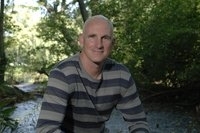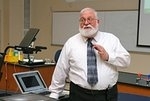Environmental Information Coalition
| Topics: |
This content is not assigned to a topic
|
The Environmental Information Coalition (EIC) is a partnership of diverse environmental scientists, educators, and professionals, and the organizations, agencies, and institutions for which they work. The Stewardship Committee of the EIC developes policies and guidelines for the Encyclopedia, with input from Topic Editors and Authors (Environmental Information Coalition). The Committee's responsibilities include:
- review of qualifications of all applicants for roles of Author and Topic Editor
- development and enforcement of content and editorial guidelines
- arbitration of disputes
- identification and recruitment of [[Authors (Environmental Information Coalition)]2], Topic Editors, Content Sources, and Content Providers
Current Members of the Stewardship Committee:
|
A. Karim Ahmed, Ph.D., is President of the Global Children's Health and Environment Fund (GCHEF), a non-profit international organization based in Washington, DC. In addition, Dr. Ahmed is a member of the Board of Directors of the National Council for Science and the Environment (NCSE), where he serves as its Secretary/Treasurer and Senior Staff Advisor. Previously, Dr. Ahmed was Senior Fellow and Deputy Director of the Program on Health, Environment and Development at the World Resources Institute (WRI) in Washington, DC. On behalf of WRI, Dr. Ahmed helped launch the 1998-99 World Resources Report (WRR) at a press briefing in New Delhi, India in July 1998, and gave a major public address on the impact of climate change on human health at the first Indian National Conference on Environment and Health. (The WRR is a bi-annual joint publication of WRI, United Nations Environment Programme, United Nations Development Programme and the World Bank). |
|
MSc. Juan Pablo Arce has over 20 years of experience working in conservation and the international development field with a strong background in conservation biology, environmental policy, biodiversity conservation, and biodiversity information management focused primarily in Latin America sustainable development and local communities’ initiatives. As former Vice-Minister of Natural Resources and Environment under the Sustainable Development and Environmental Ministry of Bolivia, he was responsible for the governmental legal and policy strategy related to sustainable development, CITES, the Convention of Biological Biodiversity, the Ozone Depletion Committee, the National Agriculture Council, RAMSAR, Air and Water Control Quality Commission, and many other environmental tasks at national and international level. As Chairman of the Board, National Trust Fund for Environment (Fondo Nacional para el Medio Ambiente-FONAMA) in Bolivia, he was responsible of the overall investment planning from international agencies such as the World Bank/GEF, IDB, GTZ, EU and other key donors. Mr. Arce coordinated financial initiatives to consolidate a protected areas endowment fund and improve projects and programs for the sustainable development of the country. |
|
Dr. Cutler J. Cleveland is Professor of Geography and Environment at Boston University, where he also is on the faculty of the Center for Energy and Environmental Studies. Dr. Cleveland is Editor-in-Chief of the Encyclopedia of Energy (Elsevier, 2004), winner of an American Library Association award, the Dictionary of Energy (Elsevier, 2005), and the journal Ecological Economics. He is the recipient of the Adelman-Frankel Award from the United States Association of Energy Economics for unique and innovative contributions to the field of energy economics. Dr. Cleveland currently is a member of the American Statistical Association’s Committee on Energy Statistics, an advisory group to the Energy Information Administration. |
|
Dr. Sidney Draggan, an Ecologist and Science Policy Analyst, served most recently as Senior Science and Science Policy Advisory to the Assistant Administrator for Research and Development at the Environmental Protection Agency. He joined the staff of the Immediate Office of the Assistant Administrator in 1997 after serving for two years as Special Assistant for Science to the Administrator (Carol Browner) and Deputy Administrator (Fred Hansen) of the U.S. Environmental Protection Agency. He is an Ecologist (Ph.D. in Systems Ecology) with special interests in science policy research and analysis; environmental assessment, monitoring and management; chemical testing and control; and international environment policy. |
|
Dr. J. Emmett Duffy is Professor of Marine Science and Chair of the Department of Biological Sciences at the College of William and Mary's Virginia Institute of Marine Science. He received the Ph.D. in Marine Science from the University of North Carolina at Chapel Hill, and has held postdoctoral positions at the Smithsonian Institution and the University of California, Davis. Dr. Duffy is a marine ecologist whose research focuses on the evolutionary origins, ecological maintenance, societal importance, and conservation of biological diversity. In 2006 he was awarded an Aldo Leopold Leadership Fellowship, and he has served on editorial boards of the journals Ecology, Ecological Monographs, Ecology Letters, and the Journal of Ethology. |
|
Dr. Andrew Jorgensen is at the National Council for Science and the Environment while on sabbatical leave from the University of Toledo. His primary work at NCSE is the development of climate change curricular materials and writing chemistry articles for the Encyclopedia of Earth. At Toledo he directs the introductory chemistry program and works on innovation educational techniques for the classroom, such as personal response devices, and web applications for online instruction. He previously served as an assistant vice president for academic affairs at the university. Andy earned a Ph.D. in Physical Chemistry from the University of Illinois at Chicago and a B.S. in Chemistry from Quincy University. He completed a postdoctoral appointment in chemical education at the University of Illinois at Urbana-Champaign. He has conducted research in the area of the environmental impact of synthetic fuels and other topics in analytical chemistry while working at Argonne National Laboratory during summer appointments. |
|
Ida Kubiszewski received her B.A. in Astronomy and Physics from Boston University during which she worked on the Milky Way Galactic Ring Survey. She went on to receive her M.A. in Energy and Environmental Analysis through the Center for Energy and Environmental Studies, also at Boston University. While working on her Masters, she co-founded the Encyclopedia of Earth and was the Assistant Editor for the project. Ida is currently pursuing her Ph.D. through the Gund Institute for Ecological Economics at the University of Vermont. |
|
Dr. Mark McGinley is an Associate Professor in the Honors College and Department of Biological Sciences at Texas Tech University. He has conducted research in the evolutionary, behavioral, and community ecology of animals and plants. Dr. McGinley’s recent scholarly interests focus on educating the general public about scientific (particularly environmental) issues. He is currently working closely with students in an interdisciplinary degree program, Natural History and Humanities, which combines science, literature, philosophy, and the arts in an attempt to train students to better communicate about the environment. Dr. McGinley earned a B.S. in Zoology from the University of California, Santa Barbara, a M.S. from Kansas State University, a Ph.D. from the University of Utah, and a Post Doctoral Research Fellowship at University of Minnesota. |
|
Dr. Emily Monosson is a toxicologist with a B.S. from Union College, and an M.S. and Ph.D. from Cornell University. She works part-time as a consultant, writer, teacher and researcher while navigating the ups and downs of balancing a career in science and caring for her two children. She has extensive experience reviewing and synthesizing toxicology and environmental toxicology studies and data on a range of chemicals including pesticides, UV-filters, PCBs, and chemical mixtures. As a research toxicologist, she has had first-hand experience with field studies and laboratory studies designed to evaluate the toxicity of aquatic contaminants, including the impacts of reproductive toxicants. As a writer, her goal is to translate and communicate current issues in human and environmental toxicology for the general public. |
|
Dr. Stephen Nodvin is Head of the Department of Applied Mathematics and Science at Wentworth Institute of Technology in Boston, Massachusetts. His background is in science and technology and he has held leadership positions in academia, government, and business. Dr. Nodvin received his Bachelor's degree in Biology from Emory University. As an undergraduate, he participated in student traineeships at Oak Ridge National Laboratory. He received a National Science Foundation Predoctoral Fellowship to conduct research on ecosystem functioning in the White Mountains of New Hampshire as a graduate student at Cornell University. After receiving his doctoral degree in Ecology and Evolutionary Biology, Nodvin established several high elevation ecosystem studies in locations including the Sierra Nevada Mountains of California, the coastal mountains of Maine, and the Great Smoky Mountains National Park in Tennessee and North Carolina. |
|
Dr. Peter Saundry is the Executive Director of the National Council for Science and the Environment (NCSE), a nonpartisan organization working to improve the scientific basis of environmental decision making. The NCSE works closely with the many communities that create and use environmental knowledge to make and shape environmental decisions, including academic, scientific, environmental, and business organizations, as well as federal, state and local government. As an organization where diverse communities can find common ground, the Council focuses on the role of science but does not take positions on environmental issues themselves. The NCSE is the Secretariat of the Environmental Information Coalition. |









